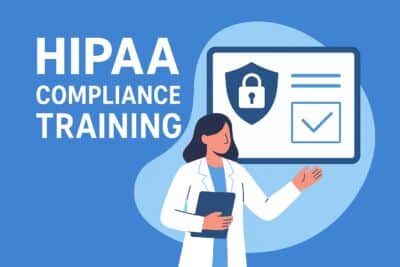In today’s digital healthcare landscape, protecting patient information is not just a best practice—it’s a legal requirement. The Health Insurance Portability and Accountability Act (HIPAA) sets strict standards for safeguarding Protected Health Information (PHI). To meet these requirements, organizations must ensure their workforce receives HIPAA compliance training.
But what exactly is HIPAA compliance training, and who needs it? Let’s break it down.
What Is HIPAA Compliance Training?
HIPAA compliance training is an educational program designed to help healthcare professionals and business associates understand HIPAA regulations, how to handle PHI, and how to avoid violations.
The training typically covers:
-
HIPAA Privacy Rule – Guidelines for protecting patient privacy and controlling the use and disclosure of PHI.
-
HIPAA Security Rule – Standards for securing electronic PHI (ePHI) through administrative, physical, and technical safeguards.
-
Breach Notification Rule – Steps to follow in case of a PHI data breach.
-
Best Practices for Data Protection – Including secure communications, password management, and safe document handling.
This training ensures that employees understand their responsibilities under HIPAA and how to maintain compliance in their day-to-day work.
Who Needs HIPAA Compliance Training?
HIPAA training is not limited to doctors and nurses—it applies to a wide range of individuals and organizations.
1. Covered Entities
-
Hospitals, clinics, and healthcare providers
-
Health insurance companies
-
Healthcare clearinghouses
2. Business Associates
Any vendor, contractor, or third party that has access to PHI, such as:
-
Billing companies
-
IT service providers
-
Medical transcriptionists
-
Cloud storage providers
3. Workforce Members
All employees, interns, and volunteers who may handle PHI directly or indirectly should receive HIPAA training, including:
-
Administrative staff
-
Receptionists
-
Lab technicians
Why HIPAA Training Matters
Failing to comply with HIPAA regulations can result in:
-
Hefty fines (ranging from thousands to millions of dollars)
-
Legal action and lawsuits
-
Loss of trust from patients and business partners
Training ensures that your staff understands how to prevent breaches, secure sensitive data, and respond to compliance challenges.
How Often Should HIPAA Training Be Conducted?
While HIPAA doesn’t specify an exact frequency, annual HIPAA compliance training is considered a best practice. Training should also be provided:
-
During onboarding of new employees
-
When regulations are updated
-
After a data breach or security incident
Final Thoughts
HIPAA compliance training is essential for anyone handling PHI—whether you’re in a hospital, a private clinic, or a support role in a healthcare-related business. By investing in regular, comprehensive training, you protect not only patient data but also your organization’s reputation and legal standing.
